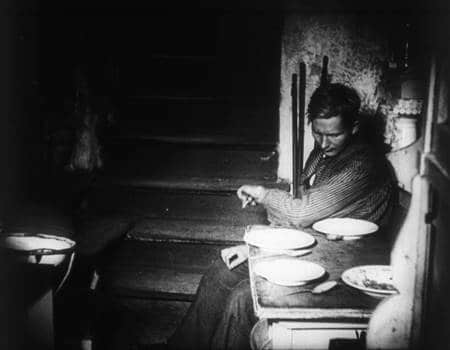How the Berlin Worker Lives + Kuhle Wampe or Who Owns the World?
Dir: Slatan Dudow
Germany, 12/76 minsmins, 35mm
How the Berlin Worker Lives (Silent)
While others found political art in social problems, this short non-fiction film, Dudow’s first work, was to be the first of a series documenting issues facing Germany. While the series never appeared, we see Dudow’s eye and knowledge of the city in his later collaboration with Brecht, Kuhle Wampe. Yet, this piece stands powerfully on its own as the faces, movements and bleak spaces of the workers provide their own indictment of capitalist inequality. Like Vertov’s Man with a Movie Camera (1929), but drained of energy and hope. Screening with Kuhle Wampe or Who Own the World? .
Kuhle Wampe or Who Owns the World?
Bertolt Brecht wrote the script for this powerful indictment of the poverty and despair of Depression Germany. The unique result is a dramatic and intellectual exchange that authorities considered too incendiary for the public, leaving it in darkness for years after its 1932 release. Kuhle Wampe (Empty Stomach) was a tent city for the dispossessed which anchors the story of a family’s decline and the path by which the heroine, Anni, stumbles through love and a future that must eventually be taken by those who will change the world. Screening with How the Berlin Worker Lives .
#11 in 1995 German Federation of Cinémathèques’
100 Most Significant German Films
5/11/2017 (Sun): Introduction by Stefan Droessler. Conducted in English
 Hong Kong Arts Centre Louis Koo Cinema (Venue)
Hong Kong Arts Centre Louis Koo Cinema (Venue) Meet the audience
Meet the audience
Remarks
- On-the-day Ticket Purchase Arrangement : Tickets are available at URBTIX outlets until one hour before the screening, after which tickets are available at URBTIX website and mobile app. On-the-day tickets will also be available at the Self-service Ticketing Kiosk of the respective venue, subject to availability.
- Unless otherwise stated, all films (except English-speaking films) are subtitled in English.
- While it is the HKIFFS’s policy to secure the best possible print of the original version for all its screenings, the HKIFFS appreciates its patrons’ understanding on occasions when less than perfect screening copies are screened.





